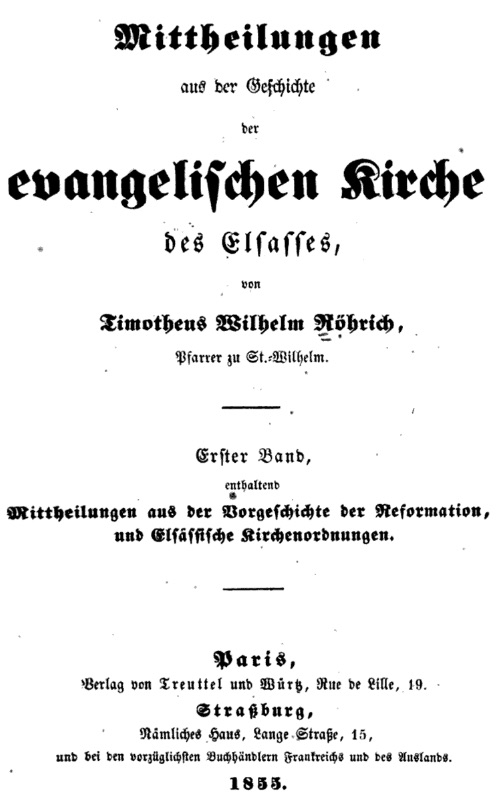History of the Alsatian Church
Here are my notes from reading a bit of "Notes from the History of the Protestant Church of Alsace, Vol. 2", published 1855.
The book is written in German, of course, and the original title is »Mittheilungen aus der Geschichte der evangelischen Kirche des Elsasses, Bände 1-2«
There are only two very brief mentions of Steinseltz (birthplace of Henry, George, and many other Aberths) in either Volume of this book – both in the 2nd Volume.
To give you an idea of the flavor of the 2nd Volume, here's the first paragraph:
Protestant Impressions
In the following Protestant Impressions one should in no way expect a thorough retelling of the history of each of our local protestant churches. Those retellings would be of, at most, individual interest. Nor is a general history of the Reformation in Alsace to be found here, since the author has already covered this topic in his prior work "History of the Reformation in Alsace and in Particular in Strasburg", 1830-1832, 3 Volumes.
(BTW, I found the author's other 3 Vol History book he mentions, and downloaded it, but it doesn't seem to contain any references to "Steinselz" or "Steinseltz".)
Anyway, on page 3, the book then immediately begins a listing of the founding years of many of the local protestant churches in Alsace:
After many years of research, and with the assistance of many friends in our homeland, were are able to trace the history of most of our local churches to their origin date.
Unfortunately, a significant portion of the church books and records lost in one of the many wars that Alsace has suffered in the last centuries; neglect also contributed here and there to the disappearance of such, so that in many communities, the church books do not reach back past the 18th century. Nevertheless, we have tried to fill these gaps to the best of our ability with further research; although we have admittedly not fully succeeded in this, and we have therefore listed those protestant communities in the following table whose founding year can be stated with at least great probability if not certainty.
Then follows a rather long table of founding years for various Alsatian local churches. Unfortunately, Steinseltz does not appear among them. However, several others from which our direct descendants hail, do (including Hunspach, home of the Nießes). I'll include here just those of interest:
Founding Date of Protestant Communities
1523 Straßburg. Weissenburg.
…
1536 Cleeburg. Hunspach? (note: "?" from author, not me)
…
1540 Rott.
…
1543 Sulz unterm Wald (Sulz in the forrest)
…
1557 Selz.
…
1565 Lembach.
…
1795 Sulzern (previously at Münster).
This table contains only the name of the primary location, not the branch locations of these communities… if we had listed the branch locations as well, the list would more than double in size. However, "volkreiche" (person-rich, larger) branches which later separated themselves from their mother communities are listed.
Further, one can see from the table above that the Reformation emanated first from the cities…
As far as I can tell from searching the web/wikipedia, the communities of "Sulz", "Selz" and "Sulzern" are separate communities from our Steinseltz/Steinselz – not the same place. I guess salt routes must have played a very important role in the area, as these names are certainly all cognate with German »Saltz« ("salt").
On to the actual mentions of Steinseltz: first, Steinseltz is barely mentioned at the end of a short story about how a small portion of Alsace had been given back to France in 1697, and the communities there were forced to convert to Catholicism.
Several violent conversion techniques are described including throwing old men from towers to their death, forcing men to freeze in the cold, and finally imprisonment in "smoke rooms" and dungeons. Apparently some of the imprisoned Protestant men were set free when they swore they'd convert to Catholicism (and pay a fee to cover costs for their imprisonment), but when they were set free, they fled to nearby Protestant communities (which were presumably still under German control), specifically: Cleeburg, Hunspach and Steinseltz.
Interesting that all three of those places are towns where our direct ancestors lived! Maybe our ancestors were among the persecuted?? No further details are given.
The second mention simply states that the Steinseltz church practiced "Simultaneum" – usage of the same church for both Protestant and Catholic services/communities simultaneously (presumably at different times of day) starting in 1685.
So I guess that means the church existed before then.
